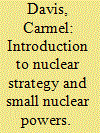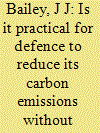|
|
|
Sort Order |
|
|
|
Items / Page
|
|
|
|
|
|
|
| Srl | Item |
| 1 |
ID:
087144


|
|
|
|
|
| Publication |
2009.
|
| Summary/Abstract |
How people react to information that runs counter to their opinions is useful for understanding their opinion consistency. This pilot study examined the consistency of students' opinions concerning the invasion and occupation of Iraq. Initial views of US policy and the role of the United Nations were elicited from 100 students. The participants were then exposed to dissonant inputs in the form of scenarios and prompt items. We predicted that opinion shift would occur as participants tried to manage the conflicting information. Constraint was measured using McNemar and chi-square tests. Anti-US policy opinion shifted significantly, but pro-UN opinion did not.
|
|
|
|
|
|
|
|
|
|
|
|
|
|
|
|
| 2 |
ID:
087138


|
|
|
|
|
| Publication |
2009.
|
| Summary/Abstract |
This paper reviews the initial findings of a research programme which was designed to establish the utility of the British Army's Mission Command approach beyond the contextual confines of the military environment. The military metaphor has been widely used throughout business literature but, there has been little research to justify or refute the validity of such comparisons. This programme evaluates the utility of key military leadership and management techniques through an examination of Territorial Army (TA) Officers who have been selected and trained by the British Army while establishing and developing their own business practices. The research programme examines the adaptation of these key concepts by business and suggests further avenues for future research. The research suggests that the British military method of leadership and management practice does have utility within a non-military environment. The ability to share context, empower staff and ensure that context volatility is managed, which lead to competitive advantage are critical observations that have emerged.
|
|
|
|
|
|
|
|
|
|
|
|
|
|
|
|
| 3 |
ID:
087143


|
|
|
|
|
| Publication |
2009.
|
| Summary/Abstract |
This article analyzes the kinds of nuclear duels in which small nuclear powers might engage. It does so by articulating a deductive framework that describes the five ways force can be used. Nuclear weapons are means of force that can be used actively or passively to preserve or change the status quo and so can be used to support the resulting generic strategies of deterrence, defense, offense, and active and passive compellence. These are the politically purposive strategies available to conduct a nuclear duel. It then considers these strategies from the perspective of small nuclear powers by considering a case. Use of a single case makes for a more rigorous analysis of the relationship between strategies by forcing consideration of tradeoffs and complementarities. The awkwardness of the real world inherent in a single case cannot be sidestepped by use of convenient examples from other situations. North Korea is used because it is the focus of negotiations to abandon its nuclear program. In contrast, India, Israel, and Pakistan are not under international pressure at this time, and Iran does not yet possess nuclear weapons. The result is an exploration of the nuclear duel involving small nuclear powers intended to illuminate for non-specialists the opportunities, constraints, and interconnections within the space of possible nuclear strategies.
|
|
|
|
|
|
|
|
|
|
|
|
|
|
|
|
| 4 |
ID:
087141


|
|
|
|
|
| Publication |
2009.
|
| Summary/Abstract |
Climate change is one of the most significant threats to global stability and requires rapid, widespread action to limit its effects. Of this action, the legislative requirements to reduce global carbon emissions will impact on all spheres of economic activity. In the United Kingdom, Defence activity currently contributes approximately 1 per cent o the national carbon emissions total. This paper researches the subject of Defence carbon emissions, a sparsely researched field, by using information from academic, contemporary data sources, government and Ministry of Defence sources. Many consider that adapting to low carbon solutions will adversely affect military performance and effectiveness. This paper will argue that the reality is that military capability can be enhanced by adopting the energy efficiency measures and technological solutions that are both available today and those that are likely to emerge as cost effective alternatives in the coming decades. It will demonstrate that by building on the emission reductions already realised, Defence can develop and implement low carbon capabilities and practices aligned to the developing low-carbon economies and continue to deliver practical capability solutions to counter future threats.
|
|
|
|
|
|
|
|
|
|
|
|
|
|
|
|
| 5 |
ID:
087139


|
|
|
|
|
| Publication |
2009.
|
| Summary/Abstract |
Intelligence failure leading to military defeat is often examined through an apportionment of guilt or blame. Yet the capacity of the Intelligence Cycle and to support contemporary military operations is coming under increasing pressure. Doctrinal developments, and the demands of new operational theatres, suggest its principles need to be fundamentally reconsidered. Understanding essential weaknesses in the Intelligence Cycle's structure is examined against a backdrop of the staff and doctrinal environments to which it is applied. From this, proposals for the Intelligence Cycle's future applicability - and consideration of an alternative model that may be followed - are made possible.
|
|
|
|
|
|
|
|
|
|
|
|
|
|
|
|
| 6 |
ID:
087145


|
|
|
|
|
| Publication |
2009.
|
| Summary/Abstract |
Israel's counterterrorism doctrine is guided by a keen sense of military knowledge and systematic staff work on the one hand, and a total involvement of its citizens on the other. The country has no traditional model but operates on a holistic framework that combines actual experience and scenario planning - an analysis of several potential threat opportunities even if they have no chance of occurrence. Its strategic doctrine is anchored on a continuous learning process drawn from historical experience, tactical intelligence, and technological/human skills capabilities - with the ultimate goal of preemption, interdiction, and adaptation. To what extent can other nations leverage Israel's experience?
|
|
|
|
|
|
|
|
|
|
|
|
|
|
|
|
| 7 |
ID:
087142


|
|
|
|
|
| Publication |
2009.
|
| Summary/Abstract |
Tunisia is a paradox and a potential headache for the West. It is regarded as the most stable country in North Africa, with a strong economy and a government that over the past decades has stopped the spread of Islamic extremism within its borders. However, the Tunisian government has achieved this internal security by increasing restrictions on fundamental human rights, such as freedom of speech and freedom of the press. Ironically, Tunis' lack of respect for liberty, combined with economic inequality, may end up promoting violent extremism in the country in the long run, whether it is religious-influenced or not. Tunisia may be lost to violence not because of the external influences of extremist religious forces, but because of poor government policies that alienate its own people.
|
|
|
|
|
|
|
|
|
|
|
|
|
|
|
|
| 8 |
ID:
087147


|
|
|
|
|
| Publication |
2009.
|
| Summary/Abstract |
Operational Research (OR), commonly defined by practitioners as the application of scientific methodology to operational problems, had a distinguished record during World War II. This article examines the post-war use of OR in relation to the deployment of Britain's 1950s nuclear deterrent, the V-Bomber Force. The calculations of OR analysts are highlighted, together with the findings of their assessments which, it is argued, pointed to increasing operational restrictions in relation to the V-Force. The politicisation of OR is then highlighted and it is argued that different factions in the Polaris debate sought to control OR findings to support their cause.
|
|
|
|
|
|
|
|
|
|
|
|
|
|
|
|
|
|
|
|
|